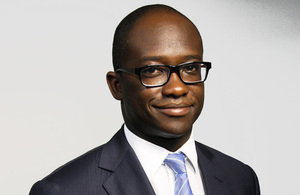Sam Gyimah hosts free speech summit
Universities minister calls on higher education leaders to work together to create new guidance on free speech

Free speech on campus should be encouraged and those attempting to shut it down must have nowhere to hide, the Universities Minister makes clear to sector leaders at a free speech summit he chaired today (Thursday 3 May).
Sam Gyimah called on higher education organisations to stamp out the ‘institutional hostility’ to unfashionable views that have emerged in some student societies and urged them to work with the government following recent reports of a rise in so-called ‘safe spaces’ and ‘no-platform’ policies that have appeared on campuses.
He said that the current landscape is “murky”, with numerous pieces of disjointed sector guidance out there, creating a web of complexity which risks being exploited by those wishing to stifle free speech.
The Universities Minister demanded further action is taken to protect lawful free speech on campus and offered to work with the sector to create new guidance that will for the first time provide clarity of the rules for both students and universities – making this the first government intervention of its kind since the free speech duty was introduced in 1986.
The guidance signals a new chapter for free speech on campus, ensuring future generations of students get exposure to stimulating debates and the diversity of viewpoints that lie at the very core of the university experience.
Universities Minister Sam Gyimah said:
A society in which people feel they have a legitimate right to stop someone expressing their views on campus simply because they are unfashionable or unpopular is rather chilling.
There is a risk that overzealous interpretation of a dizzying variety of rules is acting as a brake on legal free speech on campus.
That is why I have brought together leaders from across the higher education sector to clarify the rules and regulations around speakers and events to prevent bureaucrats or wreckers on campus from exploiting gaps for their own ends.
The free speech summit was hosted in London and brought together a wide range of influential organisations, including those that have existing guidance in this area, such as the Charity Commission, UUK and EHRC.
The Office for Students, which came into force on April 1, will act to protect free speech and can use its powers to name, shame or even fine institutions for not upholding the principle of free speech.
Sir Michael Barber, Chair of the Office for Students, said:
Our universities are places where free speech should always be promoted and fostered. That includes the ability for everyone to share views which may be challenging or unpopular, even if that makes some people feel uncomfortable. This is what Timothy Garton-Ash calls ‘robust civility’. The Office for Students will always encourage freedom of speech within the law. We will never intervene to restrict it.
Alistair Jarvis, Universities UK Chief Executive, said:
Universities are committed to promoting and protecting free speech within the law. Tens of thousands of speaking events are put on every year across the country, the majority pass without incident. A small number of flash points do occasionally occur, on contentious or controversial issues, but universities do all they can to protect free speech so events continue.
As the Joint Committee on Human Rights recently found, there is no systematic problem with free speech in universities, but current advice can be strengthened. We welcome discussions with government and the National Union of Students on how this can be done.
Notes to Editors:
The Joint Committee on Human Rights launched an inquiry on freedom of speech on 22nd November and issued its report on 25th March. A Government response will follow.
The roundtable attendee include:
- Home Office – Matt Collins, Director of Prevent
- Office for Students (OfS) – Yvonne Hawkins, Director of Universities and Colleges
- Charity Commission - Helen Stephenson, Chief Executive
- NUS - Amatey Doku, Vice President
- EHRC - Rebecca Thomas, Principal, Programmes
- Universities UK (UUK) - Chris Hale, Director of Policy
- iHE - Alex Proudfoot, Chief Executive
- GuildHE - Alex Bols, Deputy CEO